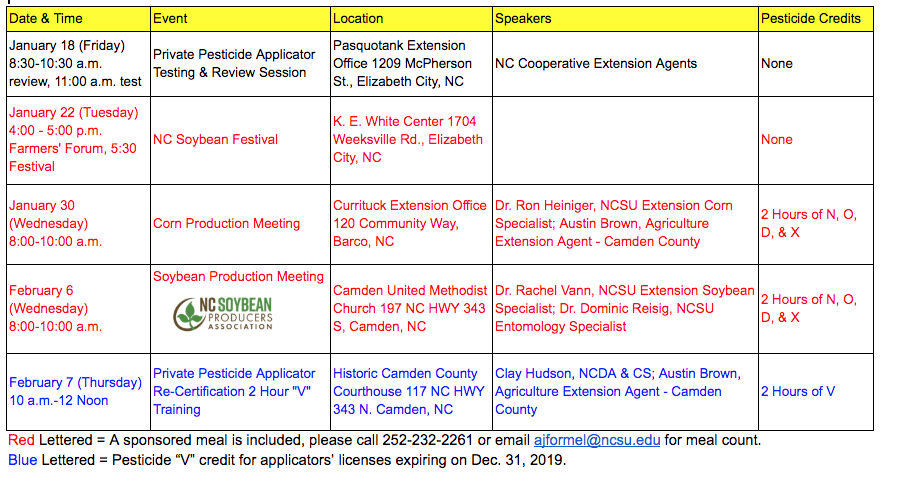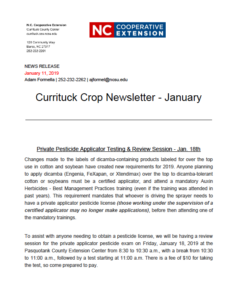Currituck Crop News-January
go.ncsu.edu/readext?573528
en Español / em Português
El inglés es el idioma de control de esta página. En la medida en que haya algún conflicto entre la traducción al inglés y la traducción, el inglés prevalece.
Al hacer clic en el enlace de traducción se activa un servicio de traducción gratuito para convertir la página al español. Al igual que con cualquier traducción por Internet, la conversión no es sensible al contexto y puede que no traduzca el texto en su significado original. NC State Extension no garantiza la exactitud del texto traducido. Por favor, tenga en cuenta que algunas aplicaciones y/o servicios pueden no funcionar como se espera cuando se traducen.
Português
Inglês é o idioma de controle desta página. Na medida que haja algum conflito entre o texto original em Inglês e a tradução, o Inglês prevalece.
Ao clicar no link de tradução, um serviço gratuito de tradução será ativado para converter a página para o Português. Como em qualquer tradução pela internet, a conversão não é sensivel ao contexto e pode não ocorrer a tradução para o significado orginal. O serviço de Extensão da Carolina do Norte (NC State Extension) não garante a exatidão do texto traduzido. Por favor, observe que algumas funções ou serviços podem não funcionar como esperado após a tradução.
English
English is the controlling language of this page. To the extent there is any conflict between the English text and the translation, English controls.
Clicking on the translation link activates a free translation service to convert the page to Spanish. As with any Internet translation, the conversion is not context-sensitive and may not translate the text to its original meaning. NC State Extension does not guarantee the accuracy of the translated text. Please note that some applications and/or services may not function as expected when translated.
Collapse ▲Starting in January 2019, North Carolina Cooperative Extension in Currituck County will be publishing a monthly newsletter containing a detailed list of important agricultural related events in and around Currituck County. Each of these event descriptions will include information on what the event is about, who is presenting, when and where the event is held, and how to sign up or pre-register. Concluding the event list will be a table summarizing the material from the newsletter for quick reference. You can expect February’s letter around the first of the month!
Currituck Crop Newsletter – January
Private Pesticide Applicator Testing & Review Session – Jan. 18th
Changes made to the labels of dicamba-containing products labeled for over the top use in cotton and soybean have created new requirements for 2019. Anyone planning to apply dicamba (Engenia, FeXapan, or Xtendimax) over the top to dicamba-tolerant cotton or soybeans must be a certified applicator, and attend a mandatory Auxin Herbicides – Best Management Practices training (even if the training was attended in past years). This requirement mandates that whoever is driving the sprayer needs to have a private applicator pesticide license (those working under the supervision of a certified applicator may no longer make applications), before then attending one of the mandatory trainings.
To assist with anyone needing to obtain a pesticide license, we will be having a review session for the private applicator pesticide exam on Friday, January 18, 2019 at the Pasquotank County Extension Center from 8:30 to 10:30 a.m., with a break from 10:30 to 11:00 a.m., followed by a test starting at 11:00 a.m. There is a fee of $10 for taking the test, so come prepared to pay.
On February 26, there will be two Auxin Herbicides – Best Management Practices trainings in northeastern North Carolina. One will be held at the Currituck County Extension Center at 11:00 a.m. and the other will be held at Leon Nixon’s Catering, 749 Virginia Rd., Edenton, NC at 3:00 p.m. Labels for 2,4-D chlorine-containing products (Enlist One and Enlist Duo) do not require that an applicator be certified to apply these products over the top. However, the NC 24(c) label requires that you must attend an Auxin Herbicides – Best Management Practices training to legally apply 2,4-D chlorine over the top.
NC Soybean Festival – Jan. 22nd
The annual NC Soybean Festival will take place on Tuesday, January 22 at the K. E. White Center on the campus of ECSU. The event begins with the Farmers’ Forum at 4:00 p.m. with a panel made up of two guest speakers. Andrew Branan, Extension Assistant Professor, Agricultural & Resource Economics, NCSU; will address Land Rental and Lease Agreements, as well as Liability Issues with Farming Operations. Michelle Wang, International Marketing Specialist, NC Department of Agriculture & Consumer Services will be sharing International Marketing Opportunities for NC Soybean. The doors open to the public at 5:30 p.m. to view exhibits, with the program officially starting at 6:15 p.m. This year’s program again consists of the announcement of the poster contest awards and the recognition of the soybean yield contest winners from Currituck, Camden, Pasquotank and Perquimans. Dinner and entertainment will be provided.
Corn Production Meeting – Jan. 30th
The Camden/Currituck Corn Production Meeting is planned for Wednesday, January 30 from 8:00 a.m. to 10:00 a.m at the Currituck Extension Office. Dr. Ron Heiniger, NCSU Extension Corn Specialist will be presenting on maximizing corn production. Two hours of N, O, D, & X pesticide credits will be offered. Breakfast will be provided. To get an accurate meal count, a pre-registration link and instructions are listed below.
Soybean Production Meeting – Feb. 6th
The Soybean Production Meeting is scheduled for Wednesday, February 6 from 8:00 to 10:00 a.m. at the Camden United Methodist Church, 197 NC HWY 343 S., Camden, NC. Two specialists from NCSU will be presenting on maximizing soybean production, Dr. Rachel Vann, Extension Soybean Specialist, and Dr. Dominic Reisig, Entomology Specialist. Two hours of N, O, D, & X pesticide credits will be offered. Breakfast is provided and sponsored by the NC Soybean Producers Association. A pre-registration link and instructions are listed below to obtain a meal count.

Private Pesticide Applicator Recertification: 2 Hour “V” Training – Feb. 7th
On Thursday, February 7 from 10:00 a.m. to 12:00 noon, Mr. Austin Brown, Agriculture Extension Agent – Camden County and Mr. Clay Hudson, NCDA & CS will be offering a Private Pesticide Applicator Recertification 2 Hour “V” Training upstairs in the Historic Camden County Courthouse, 117 NC HWY 343 N, Camden, NC. This course offers two hours of the required “V” credits. After this meeting, the next opportunity in Currituck/Camden counties to obtain these “V” credits will not be until August 2019, before the September 30, 2019 deadline.
Pre-registration for the Soybean Festival, Corn and Soybean Producer’s Meetings is required for meal counts. You can register online at go.ncsu.edu/winteragmtgs2019 or by contacting the office at 252-232-2261. No payment is required for either of the provided meals to those that pre register.
For more information or for accommodations for persons with disabilities please contact Adam Formella at 252-232-2262 or email ajformella@ncsu.edu no later than five business days before the event.






